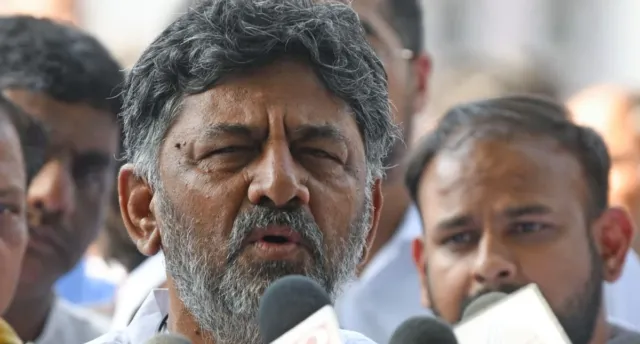
Supreme Court Assigns CBI Plea Against DK Shivakumar to Justice Kant’s Bench
The Supreme Court of India has reassigned the Central Bureau of Investigation’s (CBI) plea concerning a disproportionate assets case against Karnataka Deputy Chief Minister DK Shivakumar to a bench headed by Justice Abhay S. Oka and comprising Justice Augustine George Masih. The assignment was initially scheduled for a different bench, but has now been altered. This decision places the sensitive case under the scrutiny of Justice Kant’s bench, marking a significant development in the ongoing legal saga surrounding the prominent Congress leader.
The CBI’s plea stems from an investigation into allegations that DK Shivakumar amassed assets disproportionate to his known sources of income. The case has been a long-standing legal battle, attracting considerable attention due to Shivakumar’s influential position in Karnataka politics and his close association with the Indian National Congress.
Previously, the Enforcement Directorate (ED) had also initiated investigations into Shivakumar concerning alleged money laundering activities. These investigations have added layers of complexity to the legal challenges faced by the Deputy Chief Minister. The CBI’s involvement further intensifies the scrutiny and could potentially lead to more stringent actions depending on the findings of the investigations.
The case originates from a First Information Report (FIR) filed against Shivakumar based on findings from the Income Tax Department. The allegations suggest significant discrepancies between his declared income and the assets he possesses. Such cases of disproportionate assets are treated seriously under Indian law, often resulting in extensive investigations and potential prosecution.
The reassignment of the case to Justice Kant’s bench is noteworthy because it signifies the Supreme Court’s continued oversight of the matter. The apex court’s involvement underscores the importance of ensuring a fair and impartial investigation, free from political interference. Justice Kant’s bench is now responsible for reviewing the CBI’s plea and determining the next course of action.
The implications of this legal battle extend beyond Shivakumar personally. It also carries significant political ramifications for the Congress party in Karnataka. As a key figure in the state government, any adverse outcome for Shivakumar could potentially destabilize the ruling coalition and impact governance. The opposition parties are closely monitoring the developments, seeking to capitalize on any perceived weakness or vulnerability arising from the legal proceedings.
The proceedings before Justice Kant’s bench are expected to be closely watched by the media and the public. The legal arguments presented by the CBI and Shivakumar’s defense team will be crucial in determining the direction of the case. The Supreme Court’s decision will have far-reaching consequences, not only for Shivakumar but also for the broader landscape of Karnataka politics.
The legal processes are intricate and often prolonged, and the final outcome remains uncertain. However, the reassignment of the CBI’s plea to Justice Kant’s bench marks a critical juncture in the ongoing legal saga surrounding DK Shivakumar. The coming weeks and months will likely witness intense legal maneuvering and public debate as the case unfolds before the Supreme Court.
Here are some key aspects of the case:
- Disproportionate Assets: The core allegation revolves around DK Shivakumar allegedly possessing assets exceeding his known sources of income.
- CBI Investigation: The CBI is actively investigating the allegations and has filed a plea before the Supreme Court.
- ED Involvement: The Enforcement Directorate is also investigating Shivakumar for alleged money laundering activities.
- Political Ramifications: The case has significant political implications for the Congress party in Karnataka.
- Supreme Court Oversight: The Supreme Court’s involvement ensures a fair and impartial investigation.
The Supreme Court’s decision on this case will set a precedent for similar cases of disproportionate assets and reinforce the importance of accountability in public life.
Disclaimer: This report is auto-generated by AI.




